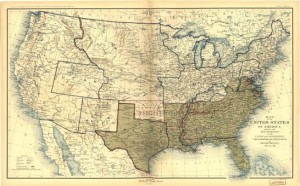 Sagging Confederate fortunes weigh heavily on the minds of many white Southerners. Yet for others, resolve and determination grows with each setback. Today in Oklahoma yet another military setback steels the resolve of the many ardent Confederates.
Sagging Confederate fortunes weigh heavily on the minds of many white Southerners. Yet for others, resolve and determination grows with each setback. Today in Oklahoma yet another military setback steels the resolve of the many ardent Confederates.
In what becomes known as the Battle of Middle Foggy, 350 federal Cavalrymen under Union Major Charles Willets cross into Indian Territory (Oklahoma) as part of a larger effort to invade Texas and disrupt the South’s ability to defend the strategic city of Shreveport, Louisiana.
Willets’ target is a Confederate outpost at Middle Foggy in the Choctaw Nation (later Atoka County). The attacking cavalry vastly outnumber the roughly ninety Confederate defenders. Some rebels manage to fall back to the safety of an approaching Seminole column, but forty-seven are killed, many of whom are wounded during the battle and then executed afterwards under orders from Willets’ superiors. There are no Union casualties in this lopsided battle, and the federals retreat to safety following the execution of the Confederate wounded.
The brutal nature of the battle angers Confederate soldiers and officers, further strengthening the determination of many to win the war at any cost.
Also contributing to Confederate resolve is a Southern religion that equates the sacrificial nature of Christian faith to loyalty to and sacrifices for the Confederate nation, as an article in this week’s Georgia Baptist Christian Index illustrates.
One year, perhaps a few months, will terminate the present struggle for nationality. A few more scenes of strife upon the sanguinary field and our fate will be decided. The issues are momentous. Not only life and death, liberty and vassalage are pendant to our success; but what is more, the virtue and purity of our noble women, and the cause of religious morality and divine Truth. What shall we do to meet this great issue successfully? Two things. 1st, Look up to God, for the battle is not yours, but His. Then let every praying heart be fervently engaged in solemn invocation for the Divine interposition. That He may be a present help in this day of trouble. “Call upon me in the day of trouble and I will deliver thee”–this is his promise; let us plead it in faith, with the wrestling spirit of Jacob. He will avenge his own elect that cry unto him day and night, though he bear long with them. 2d, Every man must give himself to his country. This is no time for croaking, for selfishness, for money making. “Offer the sacrifices of righteousness and put your trust in the Lord.” Every man must do his duty. Every one who can must go to the field, those who cannot, must support the country, feed the poor, make provisions for the army, support the government. Do all in his power to gain success and efficiency to our efforts for freedom. The struggle will be short, and if we do our duty, our whole duty, the right arm of Jehovah will bring us deliverance.
Zion struggles too, a fearful crisis seems to be upon her. Many of her devout sons are torn away from her and have gone to meet our national enemies on the ensanguined field, their places are left vacant, and their influence sadly missed. But many of her friends are yet at home, and watch with sadness the waning of interest of her once devout lovers, and her alarming decline from former vigor and healthfulness. The future success and perpetuity of our republic, depends upon our adherance to heaven’s institutions and laws; but the present tendency is to let these die out of sheer neglect. The sanctuaries are being left without their wonted number of devout worshippers. The house of prayer is abandoned for ease or for the gains of business.–A fearful retrogression is observable in the servants of the most High, as to the ardor of their attachment to His cause. What shall be done? This is a time when in the concerns of religion it is peculiarly important that “every one should bear his own burden.” None should wait for another, but each feeling his own personal responsibility before God, should do with his might, whatsoever his hands find to do. Every one should stand in his own place, and contribute of his best moral influence every day to the course of religious truth and parity.
The cloud may pass away soon, the storms be lulled to quiet, and the surging waves be stilled, then how grateful to our moral consciousness that we did not forsake the Zion of our covenant keeping God….
If pure determination would make the difference, the dogged dedication to the Confederacy evidenced by many white Southerners would win this war. Yet the reality is that fewer and fewer Southern whites are wholly committed to the Confederate cause, while at the same time the ranks of Union soldiers are constantly replenished by new recruits.
Against such odds only an all-powerful God can ensure victory against the North, many white Southern Baptists are certain. The Southern covenant with God is (seemingly) based on personal morality, church attendance, white supremacy and black bondage. But what if white Southerners do their dutiful part in remaining loyal to God’s spiritual and racial laws and institutions, yet God proves unable to uphold is end of the bargain by defeating the North?
Source: Christian Index, February 12, 1864


